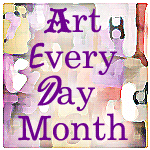I just looked up a post I had written to unschooling basics a few months ago, about learning math, and liked what I had to say, so I'm reposting here!
I'd like to point out that more than likely, your daughters know how to "do math", they just don't know they know! It's nearly impossible to live a life and not do math. We *live* math every day, in every moment. As I'm sitting here, I see two windows in front of me. Each of those windows has a blind, and pulled halfway, I can see 19 slats on each blind. I have one computer screen in front of me, and the ratio of my screen size to my firefox window size is about 1: .75. I had to stop to count the slats, but by being here, sitting here and having open eyes and a fully functioning brain, I already *knew* that. Our brain takes in so much, all the time!
Ideally, doing math is really just putting what you already know down in words and symbols. It's using a specific language to express the *idea* of math. Unfortunately, schools have caused people to believe that math IS the symbols, which couldn't be farther from the truth. Unschooling allows kids the time and space to take in all of this beautiful math, all around us, in their own way. They are LIVING math, by being alive, and being allowed the time to process what they live. It all comes together, eventually, what they live and the language used to express it. We don't have to rush the language part, the abstract portion of it. Just be alive. Do stuff. Take time to just BE, and breathe, and dream. Watch the dust motes in a sunbeam - the number of them, how they play around each other. It can make music, if you let it! That's ALL math. You don't have to count the dust particles - just watch them, your brain will KNOW how many there are. You don't have to access the part of your brain that knows, to benefit.
What I've seen in my own kids is that when the need or desire is there for formal math notation learning, that part can happen very quickly, because they've been given the space for math to be a living, real thing in their life, not just symbols on a page. It doesn't have to look like math-in-school to BE math. Math is quantity, and space, and the relationships therein. You can't escape it. You don't have to turn real-life things into a "math lesson" for them to live it. Trust that their brains ARE learning it. IF the kids are interested, and curious, absolutely explore that interest, but don't feel like they're missing it if they don't do things that school would call math.Oh, I looked it up because Peter Gray is looking for stories of real-life math learning. If you have some, you can let him know!




1 comment:
Beautifully said!
Post a Comment